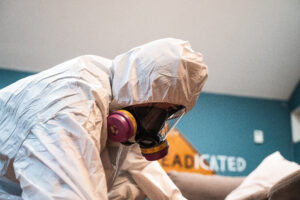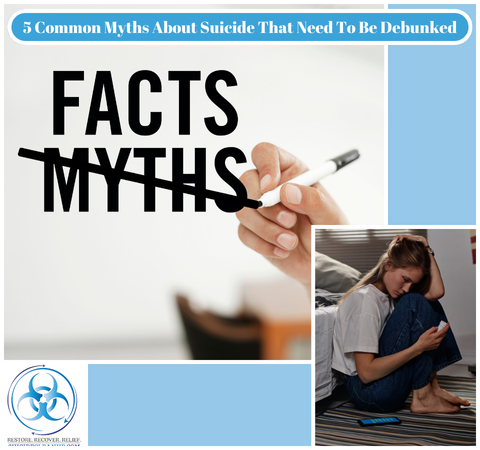Guidelines for Handling Suicide Cleanup
October 2, 2024
5 Common Myths About Suicide That Need To Be Debunked
November 7, 2024Suicide cleanup is a specialized service that involves the safe and thorough removal of biohazards such as blood, bodily fluids, and other contaminants from the scene of a tragic event. These situations are not only emotionally devastating for families and loved ones but also pose significant health risks due to the potential presence of harmful pathogens.
Whether you’re seeking information for yourself or to support someone else, knowing what to expect and understanding the importance of professional help can make a significant difference when trying to learn how to clean up after suicide.
The Impact of Suicide on Loved Ones
Losing someone to suicide turns your world upside down. In the aftermath, those left behind often struggle with a mix of powerful emotions—deep sadness, shock, anger, guilt, and a feeling of not knowing what to do next. These feelings can be so intense that they make it hard to move forward.
After such a loss, people find themselves dealing with both emotional pain and unexpected practical issues. One of the most difficult tasks is cleaning up after the suicide. It’s a harsh reality that can make the grief even harder to bear and slow down the healing process.
It’s important to remember that healing from this kind of loss takes time and often requires help. Many people find it useful to talk to a professional counselor or therapist who can guide them through their grief. Others find comfort in support groups, talking with people who have been through similar experiences. Groups like the American Foundation for Suicide Prevention (AFSP) can help connect you with these kinds of support.
During this tough time, the main focus should be on emotional recovery and remembering your loved one. Dealing with the cleanup of the site shouldn’t fall on the shoulders of family members who are already carrying such a heavy emotional burden. Biorecovery has a staff of professionals who are trained to handle these situations with care and respect, allowing family members to focus on what’s most important—healing and honoring the memory of the person they’ve lost.
Common Concerns About Suicide Scene Cleanup
When faced with the task of cleaning up after a suicide, many people have questions and concerns. Understanding these issues can help you make informed decisions during this difficult time.
Biological Hazards
A suicide scene often involves biohazardous materials such as blood and other bodily fluids. These substances can harbor dangerous pathogens, including bloodborne viruses like HIV and Hepatitis B or C. Without proper protective equipment and cleaning techniques, attempting to clean up these materials yourself can pose serious health risks.
The danger isn’t always visible to the naked eye. Even small amounts of biological material can pose significant health risks if not properly cleaned and disinfected. Professional cleanup services use specialized equipment and techniques to ensure all biohazard materials are safely removed and disposed of.
Mental Health Considerations
Beyond the biological hazards, the act of cleaning up after a loved one’s suicide can be extremely traumatic. This task can exacerbate grief and potentially lead to long-lasting emotional distress. It’s crucial to prioritize your mental well-being and consider whether you’re emotionally prepared to handle such a task.
Many people underestimate the emotional toll of cleanup until they’re in the midst of it. The process can bring back painful memories and intensify feelings of loss. Professional cleanup services can provide a buffer, allowing you to focus on your emotional healing instead of the traumatic details of the scene.
Legal Requirements for Crime Scene Cleanup
Another important aspect to consider is the legal side of suicide scene cleanup. There are specific regulations and procedures that need to be followed to ensure safety and compliance.
Procedures to Follow
While laws vary by state, there are generally specific regulations governing the cleanup of biohazardous materials. These often include proper disposal methods, the use of specific cleaning agents, and documentation requirements. Failing to adhere to these regulations can result in legal complications.
Professional cleanup services are well-versed in these regulations and can ensure that all cleanup activities are performed in compliance with local, state, and federal laws. This can provide peace of mind and protect you from potential legal issues down the line.
Steps to Avoid Issues in Suicide Scene Cleanup
To navigate this difficult process safely and legally, consider following these steps:
- Do not enter the scene until law enforcement has completed their investigation and released the area.
- Contact your insurance provider to understand what coverage you may have for biohazard cleanup. The insurance experts in our office can assist you with this part of the process.
- Do not attempt to clean the area yourself without proper training and equipment.
- Secure the area to prevent unauthorized access and potential contamination spread.
- Research and contact professional suicide cleanup services.
- Ask the cleanup service about their licensing, insurance, and adherence to OSHA regulations.
- Ensure all contaminated materials are disposed of according to local and federal regulations.
- Keep detailed records of all cleanup activities and expenses for insurance and potential legal purposes.
- Consider seeking emotional support or counseling to help cope with the traumatic nature of the situation.
Recognizing the Role of Law Enforcement
It’s important to understand that law enforcement’s role typically ends after their investigation is complete. They are not responsible for cleanup. Once they’ve finished their work, the responsibility for cleaning and restoring the area falls to the property owner or family. Many people are surprised by this, as they assume that the authorities will handle all aspects of the aftermath.
Professional Suicide Cleanup Process
When facing the aftermath of a suicide, many people are unsure about how to proceed with the cleanup. Professional services offer a safe, thorough, and compassionate solution to this challenging task. Understanding when to hire professionals and what their process entails can help you make informed decisions during this difficult time.
When to Hire Professionals
Professional cleanup services offer several advantages:
- Expertise in Handling Biohazardous Materials Safely: Trained professionals use proper protective equipment and follow strict protocols to prevent the spread of pathogens.
- Knowledge of Legal Requirements and Proper Disposal Methods: Professionals ensure all materials are disposed of legally and safely, protecting you from potential legal complications.
- Use of Specialized Equipment and Cleaning Agents: They employ industrial-grade disinfectants and specialized equipment to ensure thorough decontamination.
- Ability to Thoroughly decontaminate Affected Areas: Professionals can identify and clean areas that may not be obviously contaminated, including hidden spaces.
- Emotional Buffer for Family Members: Professional services allow family members to focus on their emotional healing instead of dealing with distressing cleanup details.
Situations Requiring Expert Handling
While every situation is unique, professional services are particularly crucial in cases involving:
- Significant Blood or Bodily Fluid Spillage: Large amounts of biological materials increase the risk of pathogen exposure and require specialized cleaning techniques.
- Decomposition (In Cases of Unattended Death): This presents additional biohazards and odor issues that require professional-grade equipment and techniques.
- Contamination of Porous Materials Like Carpets or Drywall: Professionals can determine when materials need to be removed and replaced, ensuring no hidden contamination remains.
- Presence of Other Biohazardous Materials: Professionals are trained to identify and safely handle a wide range of biological hazards that may be present.
- Large Affected Areas: For contamination spread across multiple rooms or levels, professional services have the resources to handle large-scale cleanups efficiently.
Evaluating these factors will help you make an informed decision about engaging in professional suicide cleanup services. This approach ensures the affected area is safely restored while safeguarding your well-being.
The Process of Professional Cleanup
Initial Assessment
Upon arrival, professionals will:
- Evaluate the extent of contamination
- Identify affected areas, including hidden spaces
- Develop a comprehensive cleanup plan
- Provide an explanation of the process to family members or property owners
Cleanup and Sanitization
The cleanup process typically involves:
- Establishing containment to prevent cross-contamination
- Removing all visible traces of blood and bodily fluids
- Cleaning and disinfecting affected surfaces
- Disposing of contaminated materials according to regulations
- Deodorizing the area to eliminate any lingering odors
Restoration to Safe Condition
The final step involves:
- Ensuring all areas are thoroughly sanitized
- Replacing materials that couldn’t be decontaminated (e.g., affected carpeting or drywall)
- Conducting a final inspection to verify the area is safe for occupancy
- Providing necessary documentation for insurance purposes or legal requirements
This structured approach ensures a thorough, safe, and compliant cleanup process, allowing families to focus on their emotional recovery rather than the traumatic details of the cleanup.
About Suicide Cleanup
Suicide Cleanup understands the sensitivity and complexity of suicide cleanup situations and approaches each case with compassion, discretion, and professionalism. Our trained technicians are available 24/7 to provide expert cleanup services, ensuring that affected areas are thoroughly decontaminated and restored to safe conditions. Our team takes full responsibility for managing all aspects of the insurance process, talking directly with insurance providers to maximize coverage and minimize your stress. We handle every detail, from initial claims to final documentation, ensuring you don’t have to worry about complex paperwork or negotiations. For situations where insurance isn’t applicable, we offer clear, transparent pricing and flexible payment options, always prioritizing your peace of mind during this difficult time.
If you’re facing the difficult task of cleaning up after a suicide, you don’t have to do it alone. For professional, compassionate assistance, call our 24/7 helpline at 888-752-5001. Our team is here to guide you through every step of the process, providing the support and expertise you need during this challenging time.



